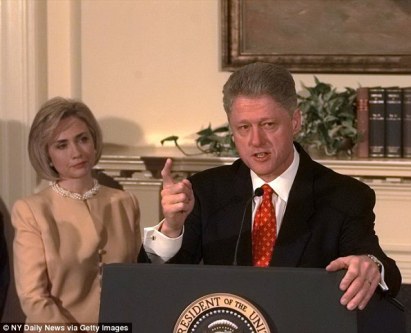Bill Clinton’s sex life has moved to the forefront of the news again.
Thanks to Donald Trump — who wrote a tweet stating “If Hillary thinks she can unleash her husband, with his terrible record of women abuse, while playing the women’s card on me, she’s wrong!” — there’s a lot of chatter about Bill Clinton’s affairs and alleged predatory behavior and unwanted advances against women. The Washington Post has even done a “fact check” that separates “Bill Clinton’s womanizing” into five “consensual affairs” (one of which was a “consensual affair” with a 22-year-old intern, Monica Lewinsky, when Clinton was the President) and other “allegations of an unwanted sexual encounter.” And some are asking: is it fair to delve into Bill Clinton’s sexual history?
 Fair? Seriously? Since when does “fairness” enter the equation in presidential politics, particularly when Donald Trump is involved? The lack of “fairness,” and the harsh spotlight that tends to shine on the families and friends of candidates for the Oval Office, is one big reason why some people decide never to throw their hat in the ring in the first place. Every candidate — and every member of their families — has to know that. It would be absurd to think that Bill Clinton and Hillary Clinton, who have spent a lifetime in politics, don’t understand that reality.
Fair? Seriously? Since when does “fairness” enter the equation in presidential politics, particularly when Donald Trump is involved? The lack of “fairness,” and the harsh spotlight that tends to shine on the families and friends of candidates for the Oval Office, is one big reason why some people decide never to throw their hat in the ring in the first place. Every candidate — and every member of their families — has to know that. It would be absurd to think that Bill Clinton and Hillary Clinton, who have spent a lifetime in politics, don’t understand that reality.
I guess the better question is, is Bill Clinton’s “sordid sexual history” — as an opinion piece by Ruth Marcus of the Washington Post described it — relevant to deciding whether Hillary Clinton should be president? Marcus says it is, reasoning that if Hillary Clinton is going to send her husband out as a campaign surrogate and play the sexism card against Trump and others, it’s fair to point out that, in Marcus’ words, Bill Clinton’s “predatory behavior toward women or his inexcusable relationship with a 22-year-old intern,” in “the larger scheme of things,” is “far worse than any of the offensive things that Trump has said.”
The Wall Street Journal goes farther, contending that there was a “Clinton war on women” during Bill Clinton’s presidency and arguing that “Mr. Clinton was a genuine sexual harasser in the classic definition of exploiting his power as a workplace superior, and the Clinton entourage worked hard to smear and discredit his many women accusers.” The WSJ opinion piece adds: “This September Mrs. Clinton declared that “every survivor of sexual assault” has “the right to be heard. You have the right to be believed.” But when her own access to political power was at stake, she dismissed the women and defended her husband.”
There are many of us, I think, who would prefer not to revisit these topics. We don’t want to hear about Bill Clinton’s lechery or think about what kind of marriage could survive so many affairs and allegations of sexual misconduct. But if Bill Clinton is going to be out on the campaign trail, and if Hillary Clinton is going to play gender politics in her bid for the White House, Bill Clinton’s personal record inevitably is going to come up.
And the Clintons had better be ready for it, because it can’t really be fully dismissed as old news. One thing is true: American culture has changed a lot since the ’90s, and the notion of what constitutes appropriate behavior in the sexual arena has perhaps changed most of all. In an era where California has enacted a “yes means yes” statute to define what constitutes sexual consent, where workplace sexual harassment allegations are much more prevalent, and people’s careers can be effectively quashed simply by using language that is deemed not politically correct, how are people going to react to detailed information about a President having an “affair” with a 22-year-old White House intern, his initial lies about it, and the humiliation the intern endured at the hands of minions seeking to excuse or explain the President’s egregious behavior? I may be wrong about this, but I doubt that a modern politician who admitted to Bill Clinton’s behavior with Monica Lewinsky — to say nothing of the other allegations about what Bill Clinton has done — would be able to survive it.
If a new generation of voters, steeped in our current culture, are hearing about that conduct in detail for the first time, how will they look at Hillary Clinton? And how will revisiting Bill Clinton’s “sordid sexual history” in the light of current social mores affect his historical reputation and his status as a kind of avuncular figure on the American political scene?
 We’ll remember 2015 as a year when we’ve lost some loved ones, but when new family members have been added through marriage. Friends and colleagues have had good news and bad news on the personal health front. We’ve seen some family members lose their jobs, while others have achieved graduate degrees and reached new heights in their professional careers. Some doors have opened, and other doors have closed.
We’ll remember 2015 as a year when we’ve lost some loved ones, but when new family members have been added through marriage. Friends and colleagues have had good news and bad news on the personal health front. We’ve seen some family members lose their jobs, while others have achieved graduate degrees and reached new heights in their professional careers. Some doors have opened, and other doors have closed.
 Coleman believes that he is leaving Columbus in better shape than it was when he took office, and I wholeheartedly agree with him. The city’s budget is in good shape. Its economy largely avoided the ravages of the recession. Its neighborhoods have been a focal point of Coleman’s tenure, and they have benefitted from his attention. Its downtown area has been revitalized, and it has some very cool areas — like the Short North and the Arena District — that visitors rave about. While other cities in the Midwest have shriveled, Columbus continues to grow. And Coleman’s tenure has been blessedly untainted by any significant political scandal.
Coleman believes that he is leaving Columbus in better shape than it was when he took office, and I wholeheartedly agree with him. The city’s budget is in good shape. Its economy largely avoided the ravages of the recession. Its neighborhoods have been a focal point of Coleman’s tenure, and they have benefitted from his attention. Its downtown area has been revitalized, and it has some very cool areas — like the Short North and the Arena District — that visitors rave about. While other cities in the Midwest have shriveled, Columbus continues to grow. And Coleman’s tenure has been blessedly untainted by any significant political scandal. Fair? Seriously? Since when does “fairness” enter the equation in presidential politics, particularly when Donald Trump is involved? The lack of “fairness,” and the harsh spotlight that tends to shine on the families and friends of candidates for the Oval Office, is one big reason why some people decide never to throw their hat in the ring in the first place. Every candidate — and every member of their families — has to know that. It would be absurd to think that Bill Clinton and Hillary Clinton, who have spent a lifetime in politics, don’t understand that reality.
Fair? Seriously? Since when does “fairness” enter the equation in presidential politics, particularly when Donald Trump is involved? The lack of “fairness,” and the harsh spotlight that tends to shine on the families and friends of candidates for the Oval Office, is one big reason why some people decide never to throw their hat in the ring in the first place. Every candidate — and every member of their families — has to know that. It would be absurd to think that Bill Clinton and Hillary Clinton, who have spent a lifetime in politics, don’t understand that reality. But you have to listen to your doctor, don’t you? And when you’re past the double-nickel milestone, you feel like you really should listen to your doctor. You’re supposed to be wise and savvy at that point, and after all, you’re paying the guy. And who knows? Maybe with that M.D. degree he might actually have some useful insight into how I might actually be able to avoid the many appalling health calamities that routinely seem to strike down men my age.
But you have to listen to your doctor, don’t you? And when you’re past the double-nickel milestone, you feel like you really should listen to your doctor. You’re supposed to be wise and savvy at that point, and after all, you’re paying the guy. And who knows? Maybe with that M.D. degree he might actually have some useful insight into how I might actually be able to avoid the many appalling health calamities that routinely seem to strike down men my age.
 That is, the United States would presume that all of its citizens have agreed to become organ donors unless and until they have “opted out.” Some European countries, most recently Wales, have gone to an “opt-out” system, and the argument is that the system will allow the U.S. to avoid the many deaths — according to the writer of the CNN piece, 22 each day — of Americans who are waiting for a life-saving organ transplant that simply doesn’t arrive in time.
That is, the United States would presume that all of its citizens have agreed to become organ donors unless and until they have “opted out.” Some European countries, most recently Wales, have gone to an “opt-out” system, and the argument is that the system will allow the U.S. to avoid the many deaths — according to the writer of the CNN piece, 22 each day — of Americans who are waiting for a life-saving organ transplant that simply doesn’t arrive in time. Huh? Syria? The Syria where a bloody civil war between the terrorist forces of ISIS and the repressive regime of Bashar al-Assad has provoked a huge refugee crisis? The Syria where significant parts of the control are under the control of a deadly terrorist group and where
Huh? Syria? The Syria where a bloody civil war between the terrorist forces of ISIS and the repressive regime of Bashar al-Assad has provoked a huge refugee crisis? The Syria where significant parts of the control are under the control of a deadly terrorist group and where  To get a sense of
To get a sense of  Don’t worry if you don’t know much about finance or economics — as the movie progresses you’ll get humorous little tutorials on the key concepts from exotic-looking women taking bubble baths, Anthony Bourdain figuring out what to do with old fish, and a prize-winning economist and Selena Gomez playing blackjack. And, of course, all along the viewer knows the catastrophe is coming. Even so, it’s uncomfortable to watch it unfold and to hear once again about Bear Stearns and Lehman Brothers and Countrywide and bailouts and the other events that made some people wonder if the American economy and capitalism would even survive the cataclysm.
Don’t worry if you don’t know much about finance or economics — as the movie progresses you’ll get humorous little tutorials on the key concepts from exotic-looking women taking bubble baths, Anthony Bourdain figuring out what to do with old fish, and a prize-winning economist and Selena Gomez playing blackjack. And, of course, all along the viewer knows the catastrophe is coming. Even so, it’s uncomfortable to watch it unfold and to hear once again about Bear Stearns and Lehman Brothers and Countrywide and bailouts and the other events that made some people wonder if the American economy and capitalism would even survive the cataclysm. This year we’ve received some excellent wine and even a fifth of pre-made old fashioned as Christmas presents. By my rough estimate, at least, we’ve received more bottles of holiday cheer this year than we have in the past.
This year we’ve received some excellent wine and even a fifth of pre-made old fashioned as Christmas presents. By my rough estimate, at least, we’ve received more bottles of holiday cheer this year than we have in the past. Yesterday Kish, Russell and I walked over to
Yesterday Kish, Russell and I walked over to  Sure, we got the updates on the delivery status of our packages, and it was useful. But then Williams-Sonoma starting sending all kinds of emails about special offers and, more recently, the availability of holiday shipping and last-minute purchases. And then we started getting similar emails from Pottery Barn, west elm, and now, Pottery Barn Outlet and Pottery Barn Kids, even though I’ve never set foot in any of those stores or visited their websites. In short, the junk email appears to be breeding. Maybe Williams-Sonoma has some kind of agreement with west elm and Pottery Barn where they sell or exchange personal information about their purchasers, reasoning that a Williams-Sonoma customer might just turn into a Pottery Barn customer — or a west elm customer, although I have never heard of west elm or any have no idea what they sell. Tree-related goods, perhaps?
Sure, we got the updates on the delivery status of our packages, and it was useful. But then Williams-Sonoma starting sending all kinds of emails about special offers and, more recently, the availability of holiday shipping and last-minute purchases. And then we started getting similar emails from Pottery Barn, west elm, and now, Pottery Barn Outlet and Pottery Barn Kids, even though I’ve never set foot in any of those stores or visited their websites. In short, the junk email appears to be breeding. Maybe Williams-Sonoma has some kind of agreement with west elm and Pottery Barn where they sell or exchange personal information about their purchasers, reasoning that a Williams-Sonoma customer might just turn into a Pottery Barn customer — or a west elm customer, although I have never heard of west elm or any have no idea what they sell. Tree-related goods, perhaps? Best holiday wishes to all — to the kids who got up early, tore through their presents in a wrapping paper-shreddingfrenzy, and now are playing with their new toys, to the tired but satisfied parents who are wondering what they are going to do with all of that wrapping paper, to people like us who are enjoying a cup of coffee as the weather finally turns colder, and to all Webner House readers, near and far, regardless of their faith or creed. May you enjoy your families and count your blessings today!
Best holiday wishes to all — to the kids who got up early, tore through their presents in a wrapping paper-shreddingfrenzy, and now are playing with their new toys, to the tired but satisfied parents who are wondering what they are going to do with all of that wrapping paper, to people like us who are enjoying a cup of coffee as the weather finally turns colder, and to all Webner House readers, near and far, regardless of their faith or creed. May you enjoy your families and count your blessings today!
 I didn’t mind working those days, but I also appreciate getting the day off on Christmas Eve — and I’m betting my colleagues who celebrate Christmas do, too. For the procrastinators among us, it’s a day to get the last-minute shopping done. For the families with young kids, it’s a day of mounting excitement building to an almost unbearable fever pitch and kids who are so amped up for Santa’s arrival that they can’t believe they’ll ever get to sleep. And for empty-nesters like Kish and me, with our shopping long done and gifts out and delivered by the post office, it’s a great day to sit with a cup of good coffee, nibble on a cookie or two, listen to some Christmas music, and ease into the holiday.
I didn’t mind working those days, but I also appreciate getting the day off on Christmas Eve — and I’m betting my colleagues who celebrate Christmas do, too. For the procrastinators among us, it’s a day to get the last-minute shopping done. For the families with young kids, it’s a day of mounting excitement building to an almost unbearable fever pitch and kids who are so amped up for Santa’s arrival that they can’t believe they’ll ever get to sleep. And for empty-nesters like Kish and me, with our shopping long done and gifts out and delivered by the post office, it’s a great day to sit with a cup of good coffee, nibble on a cookie or two, listen to some Christmas music, and ease into the holiday.